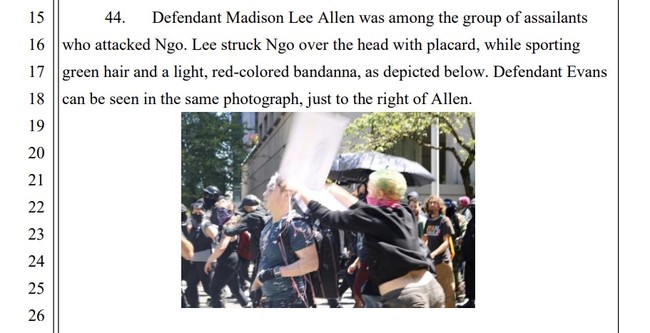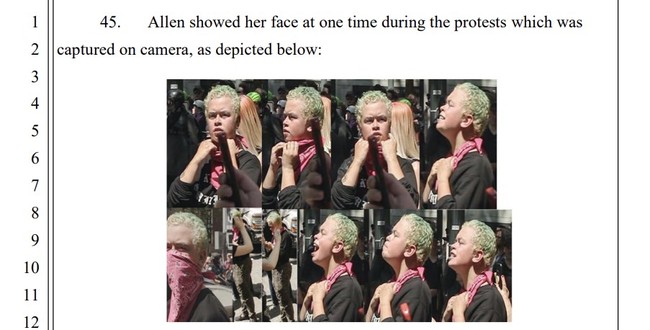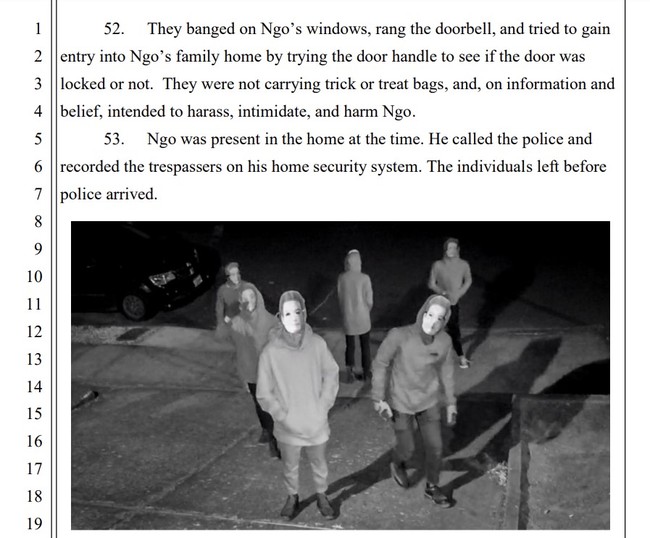After a pair of Antifa associates escaped justice, investigative journalist Andy Ngo's high-profile civil case against his Antifa attackers concluded last Monday in favor of the famed reporter, whose undercover journalism exposing Antifa's terrorist activity on the riot-ridden streets of Portland has repeatedly left him hospitalized following brutal beatings by the far-left's militant forces.
At the post-trial hearing, Multnomah County Circuit Court Judge Chanpone Sinlapasai found that Ngo was, indeed, battered and assaulted by Madison "Denny" Lee Allen, Katherine "Corbyn" Belyea, and Joseph Christian Evans—all transgenders—awarding Ngo $300,000 in damages to be split-paid equally ($100,000 each) among the three defaulted trans-identifying Antifa defendants.
In 2020, Andy Ngo filed a lawsuit in Portland, Oregon claiming assault and other injuries by alleged members of Antifa.
— The Post Millennial (@TPostMillennial) July 31, 2023
These violent attacks were caught on camera/video. pic.twitter.com/Pgd8AD9nOB
According to Ngo's civil complaint, Allen, Belyea, and Evans were involved in the June 29, 2019, attack, when Ngo was viciously beaten by a mob of Rose City Antifa members for covering an event organized by the Portland-based group. The attack, which garnered attention nationwide and is most commonly known as the viral "milkshake" incident, landed Ngo, having suffered severe injuries, in the hospital with a brain bleed. In addition to being punched by carbon-hardened tactical gloves and kicked in the head, Ngo was relentlessly doused in "concrete-infused milkshakes" and struck on the face with plywood hard-edged placards.
I was beaten on the head & robbed on 29 June. Antifa then continued to hurl "milkshakes" at my bleeding face. I was hospitalized with a brain hemorrhage. There still hasn't been a single arrest by @PortlandPolice. Help me seek justice; join my legal fund: https://t.co/QtCt7A6zJp pic.twitter.com/sis8pFo3lf
— Andy Ngô 🏳️🌈 (@MrAndyNgo) August 10, 2019
Amid the weeklong trial that preceded the Aug. 21 ruling, Ngo testified that the attack caused significant emotional distress and trauma that impacted his ability to work in the field as an on-the-ground reporter and videographer. Saddled with post-traumatic stress disorder (PTSD) and short-term memory issues, Ngo revealed that he had to undergo physical and cognitive therapy.

Recommended

Ngo's complaint against Rose City Antifa | Source: Multnomah County Circuit Court
Ngo, the son of Vietnamese refugees, also disclosed in his testimony that Antifa radicals doxxed his phone number and home address, where his parents lived, and that his family's private information had been published by far-left actors. Since, Ngo was forced to flee the U.S. to start a new life abroad, rendering him unable to take care of his elderly parents due to the displacement.
Discussing monetary damages, lawyer Dorothy Yamamoto, a member of Ngo's legal team, submitted evidence to the court that included a $1,405.60 invoice for an ambulance service, a receipt from Apple for $1,827.90 in regards to Ngo's phone being broken in the attack, and copies of Ngo's payments to an at-home security program that cost him $560.00 for the surveillance cameras, plus a $829.00 installation fee and a $57.99 monthly charge, to protect his family's house out of fear for their safety.

Ngo's complaint against Rose City Antifa | Source: Multnomah County Circuit Court
The default six-figure judgment, which was handed because the defendants failed to show up for court, followed a settlement that Ngo won against another Antifa defendant, Benjamin Patrick Bolen, also named in the Ngo v. Rose City Antifa, et al. lawsuit. Rose City Antifa as an organization was dismissed from the civil suit on grounds that it's "not a discreet entity under common law, and thus, it's an unassociated identity that cannot be sued. However, the individual co-defendants were still deemed suable.
BOOM! Update on my lawsuit against #Antifa: Oregon Court of Appeals denied defendant Benjamin Bolen's request to stop the lawsuit from being amended (stay tuned for updates). Bolen, an Antifa member who assaulted me, also recently pleaded guilty to assaulting a federal officer: pic.twitter.com/ymxULQXeU6
— Andy Ngô 🏳️🌈 (@MrAndyNgo) January 9, 2022
During the proceeding, the defense attorney representing Evans, who's legally a "they/them" and whose legal name was changed to Sammica Overkill Schott-Deputy as an anti-police message meaning "shot deputy," filed a motion requesting that the default judgement be overturned, claiming that the defendant defaulted because his client didn't know he was sued and was unable to respond to the order to appear in court since he was living in a homeless encampment across the street from the courthouse. (The court rejected the request, stating that Evans can file an appeal later.) At the time Evans was served, the "non-binary" felon with a violent and extensive criminal record spanning across several counties and states was serving prison sentences in both New York and Oregon, according to a Post Millennial report written by Seattle correspondent Katie Daviscourt.
Another photo of Portland antifa suspect Joseph Christian Evans. pic.twitter.com/3FieRWq6j0
— Andy Ngô 🏳️🌈 (@MrAndyNgo) August 13, 2019
Ngo called the legal victory "a small vindication for the disappointing jury verdict earlier this month at trial," noting that collecting on the judgments will pose "serious challenges," before thanking his counsel at lawyer Harmeet Dhillon's nonprofit Center for American Liberty for helping him "hold these attackers accountable for trying to violently silence my First Amendment rights."
Now, it's time "to collect!" declared Dhillon in response to Ngo's announcement on Twitter.
"While it will continue to be a steep uphill battle to collect today's awarded damages given the default defendants' history of evasion, I remain determined to hold Antifa and its members accountable for their violent attacks," Ngo vowed in his statement.
BREAKING: At a hearing today regarding three defaulted Antifa defendants in my Ngo v. Rose City Antifa, et al. lawsuit, the court heard evidence about the brutal June 29, 2019 beating I suffered at a Rose City Antifa event where I was seriously injured. The court found that I was… pic.twitter.com/4XlHioNXtf
— Andy Ngô 🏳️🌈 (@MrAndyNgo) August 21, 2023
Although four of the co-defendants have now been ordered to pay up, two Antifa militants got off scot-free earlier this month.
On Aug. 8, a 12-person jury found Antifa-affiliated defendants John Colin Hacker, a notorious doxxer, and Elizabeth Renee Richter not liable for assault, battery, and intentional infliction of emotional distress in Ngo's attacks. The seven-day trial was riddled with intimidation by individuals believed to be associated with Antifa, courtroom interruptions, and delays due to threats of violence. The identities of the jurors had to be sealed over serious concerns about being doxxed by external efforts to identify them. In closing arguments, the defense's activist attorney—self-identifying antif-fascist Michelle Burrows, who proclaimed in court, "I am Antifa"—told the jurors she would "remember each one of their faces" once the trial concluded. "Resistance in this country has never been peaceful," Burrows argued in defense of Antifa, admitting that Ngo's tormenters were, in fact, "terrorists."
The defendants triumphed in court despite significant evidence captured on camera and an admission of guilt by Hacker.
In Ngo v Rose City Antifa, et al., the court learned that co-defendant John Hacker admitted to identifying me to another person verbally shortly before I was accosted & then chased & beaten by black bloc Antifa militants. He claimed to not know the identities of the black bloc… pic.twitter.com/L59lD0ZOyi
— Andy Ngô 🏳️🌈 (@MrAndyNgo) August 9, 2023
During a deep-dive discussion held on X-Spaces, formerly Twitter Spaces, Ngo explained why, regardless, taking Antifa to trial was worth it, though it was difficult for him to endure as he had to re-live through the trauma and face his harassers head-on.
In the aftermath of a separate May 28, 2021, attack, when an undercover Ngo was pursued by an Antifa-led mob until he narrowly escaped, seeking refuge inside The Nines hotel in downtown Portland, the journalist began publishing less of his own writing, because of "the triggers" like "flashback moments" of "legs in black surrounding me" and Antifa "screaming my name."
"The physical pain was worse," Ngo said on the stand. "Everyday activities for months was physically painful and the triggers from this attack were way more severe. I kept thinking about that near-death experience, how these people pinned me down, beat me, and nobody helping me, with hotel staff not calling 911, it was isolating and triggered my experiences of depression."
TPM's @MrAndyNgo says the "emotional rollercoaster" of going to trial against Antifa members was worth it because, with his victory, he was able to fight for "those who have been victimized and suffered in silence." pic.twitter.com/LfjWldGGws
— The Post Millennial (@TPostMillennial) August 25, 2023
Today at 3 p.m. PT/6 p.m. ET, join this @TPostMillennial Twitter/X Space to hear me discuss the latest twists and developments in my Ngo v. Rose City Antifa, et al. lawsuit. It has been a roller coaster the last 2.5 weeks. I'll be joined by a @Liberty_Ctr attorney & my… pic.twitter.com/Mp96GktMpy
— Andy Ngô 🏳️🌈 (@MrAndyNgo) August 25, 2023
Daviscourt, Ngo's colleague at The Post Millennial who provided day-by-day trial coverage, was threatened inside the Mulnomah County Courthouse as jury deliberations were underway. Afterwards, on the heels of the landmark case's conclusion, Daviscourt found her vehicle vandalized and private property stolen, presumably by lawless Antifa extremists as an act of vengeance.
BREAKING: After I left the courthouse where I was reporting on @MrAndyNgo’s trial against Antifa, I found that my car was broken into by my hotel.
— Katie Daviscourt (@KatieDaviscourt) August 9, 2023
The windows were busted out, items were stolen, and personal identification documents were taken—I’m obviously upset. pic.twitter.com/hDSwotOTer
Windows shattered, the reporter's ransacked car was not parked near the courthouse.


